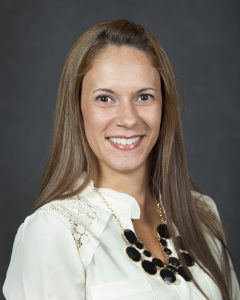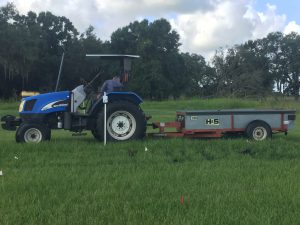When properly managed by following agronomic recommendations, biosolids may reduce the risk of phosphorus leaching from pastures, a newly published University of Florida study shows.
Biosolids come from treated domestic wastewater. During the process, the liquids are separated from the solids, which are then treated to produce a nutrient-rich product known as biosolids.

“As a general rule, we would expect crops to use nutrients in biosolids better than other nutrient sources. In most cases, we also would expect land application of biosolids to result in lower risks of nutrient leaching than commercial fertilizer sources,” said Maria Silveira, lead scientist on the new study.
That’s what Silveira’s new research showed, albeit on only one cow-calf operation in Florida. The research corroborates Silveira’s previous findings and supports the benefits of biosolids on grazing lands.
One way to dispose of biosolids is to apply them to agricultural fields. They provide essential crop nutrients such as phosphorus and nitrogen so crops can grow better.
In addition to possibly leaching less phosphorus than other nutrient sources, biosolids provide organic matter, which is a valuable resource to improve soil health, said Silveira, a UF/IFAS professor of soil, water, and ecosystem sciences.
“There is significant misunderstanding and/or public perception about the benefits that biosolids can provide,” said Silveira, a faculty member at the Range Cattle Research and Education Center (RCREC) in Hardee County. “To apply biosolids to lands, you have to adhere to strict federal, state and in many circumstances, local ordinances.”
“Historically, about two-thirds of the biosolids produced in Florida are recycled in a beneficial manner,” she said.
Biosolids are divided into “Class A” and “Class B” designations based on treatment methods. Class B refers to biosolids that have been treated to reduce pathogens to safe levels.
Silveira cited recent changes in the regulation of biosolids that will probably reduce the proportion of biosolids, particularly Class B materials that are applied to land.
For the new study, Silveira led a research team that collected soil samples from a Florida cow-calf operation. Each sample had a different history of biosolids – some with biosolids; others, without. Researchers brought the soil back to a lab at the RCREC and examined them.

At the lab, scientists sorted the soil to verify the potential impacts of different applications of biosolids on soil chemical properties. Then, scientists packed the samples into PVC columns and subjected them to different moisture regimens that mimicked the worst-case scenarios for nutrient transport – for example, intermittent flooding conditions and lack of plants.
Researchers primarily wanted to evaluate how the history of biosolids application to the pasture — and different moisture regimens (flooded vs. drained) — affected the vertical movement of phosphorus.
They found that overall, a relatively small proportion of soil phosphorus leached, Silveira said. She attributes this to the significant amounts of aluminum and iron in subsurface soil layers that retained excess phosphorus.
“An important take-home message from this study is that more field studies are necessary to evaluate and validate the soil phosphorus storage capacity concept that is currently used to determine the amount of Class B biosolids that can be safely applied,” she said.
###
ABOUT UF/IFAS
The mission of the University of Florida Institute of Food and Agricultural Sciences (UF/IFAS) is to develop knowledge relevant to agricultural, human and natural resources and to make that knowledge available to sustain and enhance the quality of human life. With more than a dozen research facilities, 67 county Extension offices, and award-winning students and faculty in the UF College of Agricultural and Life Sciences, UF/IFAS brings science-based solutions to the state’s agricultural and natural resources industries, and all Florida residents.
 2
2
